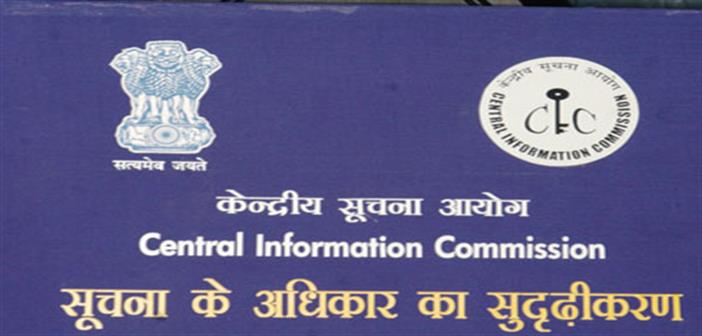The CIC is admitting less than 10% of the cases it did in January this year. Is there something fishy?

[orc]The Central Information Commission is in the news for all the wrong reasons, on the eve of the 10th anniversary of the RTI act. After the fiasco about inviting people from the civil society to the annual convention, it now seems that the CIC is rejecting/returning a large number (about 90%) of appeals/complaints based on flimsy technical grounds.
On the eve of the 10th anniversary of the implementation of the RTI act, the Central Information Commission (CIC) is in the news for all the wrong reasons. First, it was in the news for the mismanagement of invitees to the annual convention. Now, there is more than credible evidence to prove that it is rejecting a large number of appeals/complaints on flimsy technical grounds. There is a also an online petition signed by more than 2000 people seeking greater transparency from the CIC on the rejected cases. Former Central Information Commissioner, Shailesh Gandhi even wrote an open letter on this issue to Mr. Vijay Sharma, the current Chief Information Commissioner, which went unanswered.
Drastic Reduction in the Number of Appeals/Complaints admitted
As per the data available on the CIC website, a total of 17863 appeals/complaints were admitted from January to September this year. While this might not look unusual, a closer look at the number of appeals/complaints admitted each month reveals a downward trend. In the first six months of this year, an average more than 2500 appeals/complaints were admitted, while the average has come down to 800 in the next 3 months. Only 448 were admitted in August while this number further came down to 118 in September. Even in Ocotber, only 187 appeals have beem admitted till date.
This downward trend is unusual
The CIC does not reveal information about the total number of appeals received, the number of appeals admitted and number of appeals rejected without admission. This downward trend in the last 2-3 months is unusual for the simple reason that such a trend was never observed in the earlier years. There are strong reasons to believe that the CIC registry is now rejecting/returning appeals on flimsy technical grounds, effectively admitting only a handful. A conservative estimate indicates that more than 90% of the appeals received are being rejected on these flimsy grounds.
The CIC is least transparent
RTI Activist Commodore Lokesh Batra filed an application with the CIC asking for total number of cases received and total number of cases returned to the applicants. To his utter surprise, the CIC said it does not maintain such numbers. Such a response from the CIC adds credence to the argument that the CIC is trying to hide something.
Is the CIC insisting on Identity (ID) Proof?
It now seems that the CIC is insisting on submission of an identity proof along with an appeal/complaint, and this seems to be the reason for a large number of rejections. In the checklist for admission of an appeal/complaint, the CIC is asking for an ID proof of the appellant. The check list goes onto say that this is as per the order of the Punjab & Haryana High Court’s order in CWP No. 4787/2011.
The Rules do not mention ID Proof
It does seem that this insistence on the ID proof is the reason for a large number of cases being rejected. This is because a large number of appellants are not aware of this provision that an appeal has to be accompanied with an ID Proof. According to the rules notified in 2012, there is no need for an appellant to submit an ID proof along with the appeal. This was again reiterated by the government in July this year.
Wrong Interpretation of the High Court Judgment
It does seem that the CIC has wrongly interpreted the order of the High Court. The Chief Information Commissioner of the Punjab State Information Commission (SIC) was the party to the Punjab & Haryana High Court order referred to in the check list. According to RTI activist C J Karira, there are multiple reasons to believe that the CIC has wrongly interpreted the High Court order and that it was no way concerned with the order. He said,
- CIC was in no way subject to the referred case and it was not even a party to the case.
- The above mentioned order does not run large outside Punjab & Haryana.
- CIC is not bound by this judgment.
- In the judgment when the court refers to “the commission” it refers to the SIC and not the CIC
- In fact, this order of the Punjab & Haryana Court is an old one and after this judgment, Calcutta HC said that applicants can even use a post box number.
- It is clear that the Punjab & Haryana High court reached the conclusion of id proof because the SIC and FAAs in Punjab were blundering by not even mentioning names and addresses in their orders.
- P&H HC cannot pass any judgment whereby it can amend RTI Act or the rules framed there under. The court can only strike down a section of the Act or a particular rule framed there under. In this case, the court has tried to frame a new Rule of submitting ID proof.
What is the way forward?
The CIC is acting in the least transparent manner possible and it does not bode well for the future of the transparency legislation. It should immediately put all the data in the public domain and stop rejecting appeals based on flimsy technical grounds that appellants have not submitted their ID proof.